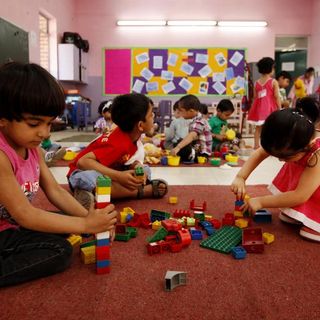
Netflix’s ‘Delhi Crime’ Tackles Rape, But Not Rape Culture
The Netflix crime thriller fails at challenging our perception of survivors.

Netflix’s crime thriller, directed by Richie Mehta, traces the story of the police investigation following the brutal gang rape of a physiotherapy student in the nation’s capital, on 16 December 2012. Through the eyes of DCP Vartika Chaturvedi, played by a faultless Shefali Shah, and her team, the ensuing manhunt to capture the six rapists of the Nirbhaya case provides the show with tight, fast-paced scenes, humming with tension. Mehta deftly weaves in details, while leaving others (like dramatizing the actual incident of the rape) out — a smart move considering the nature of the subject. It means that viewers rely on their own memory of the events, those days when the entire country was finally shaken out of complacency. But while we can credit Delhi Crime with not sensationalizing the gang rape, the show’s rhetoric around survivors, perpetrators, and the act of rape itself, is problematic at best, and at worst, actively harmful.
Despite all the rave reviews for the show, one thing is certain — the Delhi police are shown in the best possible light. It’s a disconcerting realization that the thesis of the seven episodes is that the Delhi police went above and beyond to catch the criminals, despite their investigation being hampered by the media, protestors, and politicians. While Delhi Crime is a fictionalized account of what happened, the choice to twist certain facts seems telling. After seeing the rape reported on TV, a man comes to the station to report that he had also been robbed and assaulted by the same men on the bus that night. This revelation make Chaturvedi take a moment with her colleague Bhupinder (Rajesh Tailang) to wonder if the rape could have been prevented had this man complained to the police that night. Bhupinder replies, “We don’t know that. It’s not our fault this happened.” In reality, the man in question did go to the Hauz Khas police station on December 16 to file a complaint, butwas dismissed by the police, enabling the rapists to keep driving that night. But if there’s one message Mehta wants to drive home, it’s that the Delhi police was not culpable.
It is curious then, that in a show with very clear villains – in the unrepentant Jai Singh, the main perpetrator of the crime, and his fellow rapists – other characters are also denigrated along with them. The protestors are portrayed as students with nothing better to do, and political campaigners stymie the police investigation. This is compounded by journalists who have zero ethics, with political motives to portray the police in a bad light. The survivor, named Deepika, and her family, serve as living proof of the crime, motivating the police team to crack the case and “hang those bastards.”
The man who was with Deepika that night, who was assaulted and thrown naked out of the bus with her, is portrayedas deplorable as the rapists. At various points in the show, the police cast aspersions about his morality and character. In an impassioned rage, Bhupinder insinuates that Akash was pretending to have fainted on the bus that night, instead of helping Deepika. “He could have hit back, broken the window, screamed, something! If she was my girlfriend I would have died for her,” he says. He’s so convincing that for a moment, it doesn’t register that these words sound an awful lot like victim-blaming, familiar to any rape survivor. The question of ‘Why didn’t you do more to save yourself’ has morphed into ‘why didn’t you do more to save her?’
At other points, the police circle back to the question of whether Akash has another girlfriend, and why he was feeling Deepika up in the bus that night. “Every child knows you don’t do those things on a bus,” Bhupinder yells. Rape culture relies on these arguments to justify the act — it could have been preventable had you done something differently. But rape is never justifiable, and suggesting that is incredibly harmful.
Related on The Swaddle:
Delhi HC on Marital Rape: “A Rape Is a Rape.”
In a philosophical mood while driving to apprehend one of the accused, another officer explains why a rape like this happens in India. “It’s economics,” he explains. As the gap between the rich and the poor widens, it means more crime. The uneducated youth, who don’t have access to sex education but do have access to porn, only see women as objects that they can’t have. And so they take them. “After all, they have nothing to lose,” says Sudhir, the officer. This is an opinion that most Indian uncles probably verbalize in living room conversations about India’s ‘buri halat.’ But pinning the act of rape on lower class men who want revenge for everything they don’t have, and are too uneducated to quell their natural need for sex? That’s problematic as hell. It ignores and negates rapes committed by men from higher classes, who have everything to lose yet commit the act anyway. It assumes that men’s base nature is to rape, to take without consent, and that it’s only money and education that allows them to rise above this. It is deeply offensive, and even if this was just written as the officer’s opinion, the show doesn’t offer any alternatives to make viewers question this stance.
Perhaps this is the central problem of the show, then — there’s no real examination of rape culture, of the assumptions of the police and their views about the crime. They’re simply portrayed as heroes, dutifully doing their jobs, in the face of relentless criticism.But their complicity in further cementing a culture that allows rape to happen are never challenged. When Bhupinder screams at one of the rapists he’s questioning, “Why not just kill them and be done?” as a viewer, the show moves you to agree with him. But in reality, that kind of thinking — that rape is a fate worse than death, that survivors should die rather than live after rape — values women’s virtue more than their lives.
This first season of Delhi Crime wraps up the story of Nirbhaya with Chaturvedi talking to Neeti, an Indian Police Service trainee who was stationed at the hospital, caring for Deepika and her family. Played by an excellent Rasika Dugal, Neeti is the beating heart at the centre of the investigation, empathizing with the survivor, refusing to hit or even touch the rapist in custody, and allowing viewers a humanizing glimpse behind the professionalism that the police must keep up. The cries that the rapists must hang, repeated throughout the episodes, are finally silenced by Neeti. “Everyone’s celebrating but I just feel like saying ‘Fuck this investigation.’ The statements, court cases. I just want Deepika to be okay,” she says. As the camera pans out we see what Neeti and Chaturvedi were looking at as they spoke — a tree from whose branches six effigies were hung, with a rope around each of their necks. Like much of the show’s rhetoric around rape, it misses the forest, in favor of the trees.
Nadia Nooreyezdan is The Swaddle's culture editor. Since graduating from Columbia Journalism School, she spends her time thinking about aliens, cyborgs, and social justice sci-fi. She's also working on a memoir about her family's journey from Iran to India.
Related


An Ancient, Female Handicraft Is Making Waves in Modern STEM Education
